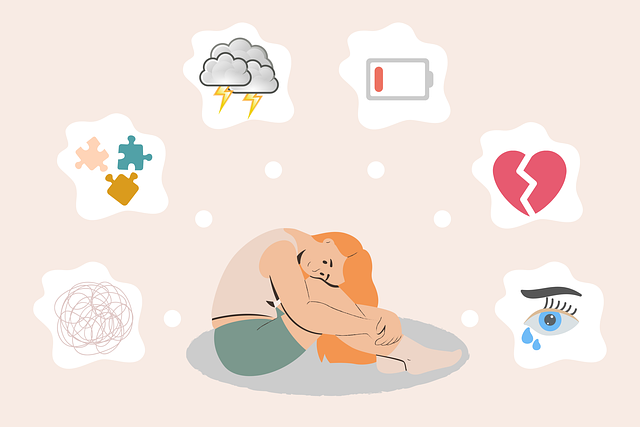Anxiety, a complex emotional state affecting daily life, is managed through understanding its causes (stress, trauma, genetics, medical conditions) and employing effective strategies like Parker Acceptance and Commitment Therapy (ACT), Mood Management, Compassion Cultivation, and Burnout Prevention for healthcare providers. ACT, emphasizing acceptance, mindfulness, and commitment to personal values, holistically improves self-esteem and well-being. Combining these techniques fosters resilience, empowering individuals to confront anxiety, maintain mental wellness, and develop robust self-care routines.
Anxiety is a common struggle, affecting millions worldwide. Understanding its symptoms and causes is the first step towards managing it effectively. This article explores various techniques to tackle anxiety, including an in-depth look at Parker Acceptance and Commitment Therapy (ACT), a game-changer for many. Discover practical daily management strategies and learn how to build resilience for long-term coping. By implementing these strategies, you can take control of your mental health and enhance your overall well-being.
- Understanding Anxiety: Symptoms and Causes
- The Parker Acceptance and Commitment Therapy (ACT) Approach
- Practical Techniques for Daily Management
- Building Resilience and Long-Term Coping Strategies
Understanding Anxiety: Symptoms and Causes

Anxiety is a complex emotional state characterized by feelings of worry, fear, or unease that can significantly impact daily life. Understanding anxiety involves recognizing its various symptoms, which may include rapid heartbeat, restlessness, insomnia, and difficulty concentrating. These symptoms often stem from underlying causes such as stress, trauma, genetic predisposition, or certain medical conditions. One effective approach to managing anxiety is through Parker Acceptance and Commitment Therapy (ACT), which focuses on accepting negative emotions and committing to valued actions despite their presence.
Beyond ACT, other strategies like Mood Management techniques teach individuals how to regulate their emotional responses. Compassion Cultivation Practices encourage self-compassion, fostering a kinder attitude towards oneself during anxious moments. For healthcare providers, Burnout Prevention Strategies are crucial to maintain resilience and mitigate professional stress levels, thereby indirectly benefiting their patients’ care.
The Parker Acceptance and Commitment Therapy (ACT) Approach

The Parker Acceptance and Commitment Therapy (ACT) approach is a game-changer when it comes to anxiety management. This therapy focuses on helping individuals accept their emotions, thoughts, and experiences without judgment, and then commit to actions that align with personal values, fostering a sense of purpose and meaning. By encouraging mindfulness, self-awareness, and the development of a robust self-care routine, ACT empowers people to take control of their mental health.
Integrating cultural sensitivity in mental healthcare practice is also integral to this approach, recognizing that everyone’s experience is unique and influenced by personal background, identity, and societal factors. This tailored perspective ensures that self-esteem improvement and overall well-being are achieved holistically, addressing not just the symptoms of anxiety but the underlying causes as well.
Practical Techniques for Daily Management

Anxiety management techniques are essential tools for navigating life’s challenges and maintaining mental well-being. Incorporating practical strategies into daily routines can significantly reduce anxiety levels and foster a sense of calm. One effective approach is Acceptance and Commitment Therapy (ACT), developed by Steven C. Hayes, which encourages individuals to accept their emotions without judgment and commit to valued actions. This therapy promotes mindfulness, helping individuals stay present and engaged in their experiences rather than dwelling on anxious thoughts.
Additionally, communication strategies play a vital role in managing anxiety. Open dialogue with loved ones or professionals can provide support and perspective. Burnout prevention strategies for healthcare providers are also crucial, as these professionals often face high-stress situations. Boosting confidence through positive self-talk and setting achievable goals can further empower individuals to confront anxiety head-on. By combining these techniques, individuals can develop resilience and effectively manage their anxiety in daily life.
Building Resilience and Long-Term Coping Strategies

Building resilience is a crucial aspect of managing anxiety in the long term. It involves developing coping strategies that enable individuals to bounce back from stressful situations and maintain mental wellness. Techniques like Acceptance and Commitment Therapy (ACT), as advocated by Parker, focus on helping people accept their emotions rather than trying to suppress them. This shifts the emphasis from avoiding or fighting anxiety to learning to live with it, thereby fostering resilience.
Healthcare providers play a vital role in promoting Resilience Building through Cultural Competency Training. By understanding the diverse cultural backgrounds of their patients, healthcare professionals can tailor interventions that resonate with individual experiences and beliefs. This personalized approach enhances the effectiveness of anxiety management strategies, ensuring long-term success in maintaining mental wellness.
Anxiety management is a journey, and by understanding its symptoms and causes, individuals can take the first step towards regaining control. The Parker Acceptance and Commitment Therapy (ACT) approach offers a powerful framework for accepting and managing anxious thoughts while promoting a meaningful life. Practical daily techniques, such as mindfulness and cognitive reframing, empower folks to navigate stress. Building resilience and long-term coping strategies ensures individuals are equipped to handle anxiety’s challenges, fostering a more balanced and fulfilling life. With the right tools and mindset, managing anxiety is achievable, allowing one to embrace life with greater confidence and clarity.














